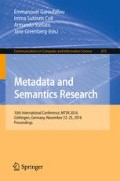Abstract
Linked Open Data (LOD) is a method of publishing machine-readable open data so that it can be interlinked and become more useful through semantic querying. The decentralized nature of the current LOD cloud relies on location-specific services, which is known to result in problems of availability and broken links. Current approaches to peer-to-peer (P2P) decentralized file systems could be used to support better availability and performance and provide permanent data, while preserving LOD principles. Applications would also benefit from mechanisms that ensure that LOD entities are permanent and immutable, independently of their original publishers. This paper outlines a first prototype design of LOD over the Interplanetary File System (IPFS), a P2P system based on Merkel DAGs and a content-addressed block storage model. The fundamental ideas on that implementation are discussed and an example implementation on the early version of IPFS is described, showing the feasibility of such approach and its main differentiating features.
Access this chapter
Tax calculation will be finalised at checkout
Purchases are for personal use only
Notes
- 1.
- 2.
Note this is a reference for the first draft, now superseded by more complete versions.
- 3.
- 4.
- 5.
Note that this paper was writing before that specification was published in Github, so some of the ideas on this paper may need re-working to be fully IPLD compatible.
- 6.
- 7.
- 8.
- 9.
- 10.
- 11.
- 12.
References
Alexander, K., Hausenblas, M.: Describing linked datasets-on the design and usage of VoID, the vocabulary of interlinked datasets. In: Linked Data on the Web Workshop (LDOW 2009), in Conjunction with 18th International World Wide Web Conference (WWW 2009) (2009)
Benet, J.: IPFS-Content Addressed, Versioned, P2P File System. arXiv preprint arXiv:1407.3561 (2014)
Bizer, C., Heath, T., Berners-Lee, T.: Linked data-the story so far. In: Emerging Concepts, Semantic Services, Interoperability and Web Applications, pp. 205–227 (2009)
Cabello, F., Franco, M.G., Haché, A.: The social web beyond ‘Walled Gardens’: interoperability, federation and the case of Lorea/n-1. PsychNology J. 11(1), 43–65 (2013)
Fernández, J. D., Polleres, A., Umbrich, J.: Towards efficient archiving of dynamic linked open data. In: Proceedings of DIACHRON, pp. 34–49 (2015)
Gonzalez, J.E., Xin, R.S., Dave, A., Crankshaw, D., Franklin, M.J., Stoica, I.: Graph processing in a distributed dataflow framework. In: 11th USENIX Symposium on Operating Systems Design and Implementation (OSDI 2014), pp. 599–613 (2014)
Haslhofer, B., Isaac, A.: Data.europeana.eu: The Europeana Linked Open Data pilot. In International Conference on Dublin Core and Metadata Applications, pp. 94–104 (2011)
Hausenblas, M., Karnstedt, M.: Understanding linked open data as a web-scale database. In: 2010 Second International Conference on Advances in Databases Knowledge and Data Applications (DBKDA), pp. 56–61. IEEE (2010)
Janssen, M., Charalabidis, Y., Zuiderwijk, A.: Benefits, adoption barriers and myths of open data and open government. Inf. Syst. Manag. 29(4), 258–268 (2012)
Johnson, J.A.: From open data to information justice. Ethics Inf. Technol. 16(4), 263–274 (2014)
Khayyat, M., Bannister, F.: Open data licensing: more than meets the eye. Inf. Polity 20(4), 231–252 (2015)
Konstantinou, N., Spanos, D.E.: Methodologies and software tools. In: Materializing the Web of Linked Data, pp. 51–71. Springer International Publishing, Switzerland (2015)
Langille, M.G., Eisen, J.A.: BioTorrents: a file sharing service for scientific data. PLoS One 5(4), e10071 (2010)
Lanthaler, M., Gtl, C.: On using JSON-LD to create evolvable RESTful services. In: Proceedings of the Third International Workshop on RESTful Design, pp. 25–32. ACM (2012)
Liu, G., Shen, H., Ward, L.: An efficient and trustworthy P2P and social network integrated file sharing system. IEEE Trans. Comput. 64(1), 54–70 (2015)
Missier, P., Belhajjame, K., Cheney, J.: The W3C PROV family of specifications for modelling provenance metadata. In: Proceedings of the 16th International Conference on Extending Database Technology, pp. 773–776. ACM (2013)
Rajabi, E., SanchezAlonso, S., Sicilia, M.A.: Analyzing broken links on the web of data: an experiment with DBpedia. J. Assoc. Inf. Sci. Technol. 65(8), 1721–1727 (2014)
Schmachtenberg, M., Bizer, C., Paulheim, H.: Adoption of the linked data best practices in different topical domains. In: Mika, P., Tudorache, T., Bernstein, A., Welty, C., Knoblock, C., Vrandečić, D., Groth, P., Noy, N., Janowicz, K., Goble, C. (eds.) ISWC 2014. LNCS, vol. 8796, pp. 245–260. Springer, Heidelberg (2014). doi:10.1007/978-3-319-11964-9_16
Wong, A., Liu, V., Caelli, W., Sahama, T.: An architecture for trustworthy open data services. In: Jensen, C.D., Marsh, S., Dimitrakos, T., Murayama, Y. (eds.) Trust Management IX. IFIP, pp. 149–162. Springer International Publishing, Switzerland (2015)
Zaveri, A., Rula, A., Maurino, A., Pietrobon, R., Lehmann, J., Auer, S.: Quality assessment for linked data: a survey. Semant. Web 7(1), 63–93 (2015)
Zuiderwijk, A., Janssen, M.: Open data policies, their implementation and impact: a framework for comparison. Govern. Inf. Q. 31(1), 17–29 (2014)
Author information
Authors and Affiliations
Corresponding author
Editor information
Editors and Affiliations
Rights and permissions
Copyright information
© 2016 Springer International Publishing AG
About this paper
Cite this paper
Sicilia, MA., Sánchez-Alonso, S., García-Barriocanal, E. (2016). Sharing Linked Open Data over Peer-to-Peer Distributed File Systems: The Case of IPFS. In: Garoufallou, E., Subirats Coll, I., Stellato, A., Greenberg, J. (eds) Metadata and Semantics Research. MTSR 2016. Communications in Computer and Information Science, vol 672. Springer, Cham. https://doi.org/10.1007/978-3-319-49157-8_1
Download citation
DOI: https://doi.org/10.1007/978-3-319-49157-8_1
Published:
Publisher Name: Springer, Cham
Print ISBN: 978-3-319-49156-1
Online ISBN: 978-3-319-49157-8
eBook Packages: Computer ScienceComputer Science (R0)

